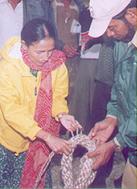Parbati Barooah is technical director for Project Elephant. Recently she conducted a mahout training program in Corbett, she herself being an expert mahout ( 'Queen of Elephants'-
a T.V serial in Discovery featured her). Among other things, mahouts were trained on how to capture wild elephants using 'mela shikar' technique.
 Mela Shikar: refers to hunting in the open i.e., capturing of elephants in the forests without erecting a stockade. Essentially the method involves the chase of wild elephants
by using trained elephants ( koonkies ) and noosing them when the opportunity arises. Mela shikhar is more popular in N.E. India than the khedda.
Mela Shikar: refers to hunting in the open i.e., capturing of elephants in the forests without erecting a stockade. Essentially the method involves the chase of wild elephants
by using trained elephants ( koonkies ) and noosing them when the opportunity arises. Mela shikhar is more popular in N.E. India than the khedda.
A standard team for mela shikar consists of a koonki elephant, a phandi ( an expert on noosing a wild elephant), a mahout and a kamla ( i.e., a grass cutter).
Koonkie elephants are specially trained to chase the wild elephants, help in noosing them and drag them to the depot. They are particularly trained to follow 'foot commands'
from their mahouts and to move silently during the entire capturing operation.
The phandi and the mahout must have a complete understanding with each other as well as with the koonki under their command. It is the duty of the 'kamla' to look after the
feeding and other requirements of the koonki back at the camp.
Experience shows that some of the common ailments of captive elephants relating to eye, feet and skin are because of filthy and unhygienic conditions of the pilkhana. (stable).
Therefore, the pilkhana must be kept clean and well drained. All the leftover fodder and dung should be removed to a distance and burnt periodically. The urine drenched floor should be covered with sand and periodically teated with a disinfectant. The feet
of the elephant may be washed with a solution of potassium permanganate at least once a week to guard against fungal attack. Elephants should be given a regular bath and their toe-nails and tusks ( if any) should be trimmed periodically. As a rule, captive
elephants should not be made to share their grazing ground and source of drinking water with other livestock to avoid infection and contagious diseases.
Using Gaddi (pad) and guddela (numdah) of improper size on working elephant exposes its spinal cord to injuries.
Hear what Parbati has to say about the image and profession of mahouts in North Eastern India.
" Elephants have been domesticated in N.E. India since time immemorial and both the elephant and the mahout have become a part of the folklore and the folk songs. Stories
of brave and expert phandis ( noosers) and mahouts are passed on from generation to generation. In rural Assam mahouts are looked upon with awe and admiration and it is not unusual for village belles to fall in love with young mahouts. An average Assamese
mahout is a jolly, good natured person-an accomplished folk singer and very much in demand in local functions and ceremonies. With his capacity to control such a big and powerful animal as the elephant, mahouts are often associated with supernatural powers.
Many of the mahouts have made a name for their knowledge of medicinal herbs. "
" Grass cutters, mahouts and phandis form their own close knit society-having their own rules, regulations and code of discipline. They have their own informal 'university' and their own system of 'examination'. A mahout becomes a phandi after passing a rigorous
test conducted by other phandis. Only a few phandis can aspire to become Baro-Phandi which is equivalent to a master's degree in elephant management. Phandis and baro -phandis derive maximum respect in the society of mahouts and they are also held in esteem
by the elephant owners and government officials. In the elephant catching operation in N.E. India, phandis and baro-phandis are the key persons and they are often known to dictate their own terms. "
Grass cutters, mahouts and phandis form their own close knit society-having their own rules, regulations and code of discipline. They have their own informal 'university' and their own system of 'examination'. A mahout becomes a phandi after passing a rigorous
test conducted by other phandis. Only a few phandis can aspire to become Baro-Phandi which is equivalent to a master's degree in elephant management. Phandis and baro -phandis derive maximum respect in the society of mahouts and they are also held in esteem
by the elephant owners and government officials. In the elephant catching operation in N.E. India, phandis and baro-phandis are the key persons and they are often known to dictate their own terms. "